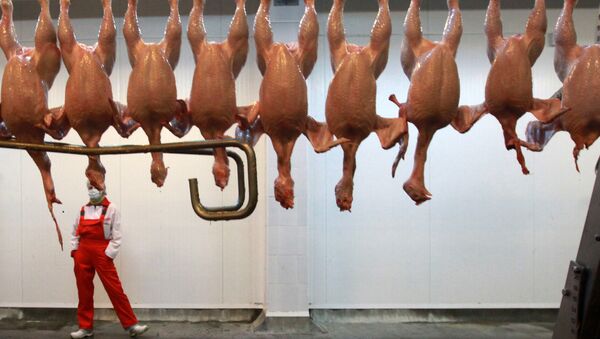“Although we are only half-way through the survey, 18% of birds tested had campylobacter over 1,000 cfu/g, the highest level of contamination, and more than 70% of birds had some campylobacter on them,” said Steve Wearne, FSA Director of Policy in a statement.
The FSA has tested 1,995 samples of fresh chickens from UK supermarkets, over a six month period which started in February this year. The investigation is set to continue for another six months and will test 4,000 chicken samples bought from supermarkets and smaller independent outlets.
The results showed that this summer, eight out of ten chickens bought contained the bug, an increase ascribed to the warm summer weather. 6% of packaging tested positive for presence of the bug. The worst offenders were supermarkets Asda, the Co-operative and Marks and Spencer, from whose stores 78%, 73% and 67% of chickens respectively tested positive.
Thorough cooking of chicken kills the bug, however it is the most common form of food poisoning in the UK, considered responsible for more than 280,000 cases of food poisoning each year and an estimated 100 deaths. The annual cost of the illness to the UK economy is put at £900 million.
Criticism was levelled at the FSA in June for backtracking on plans to immediately publish the results from the first quarter of its investigation, and the organization was accused of bowing to industry pressure. The agency justified its decision with concerns that the sample size from one quarter was too small. In response, the Guardian in July published the results of a five month investigation it carried out into hygiene in the British poultry industry, and detailed a catalogue of failures to meet standards.
“A factory floor flooded with chickens guts in which the bacteria can flourish, carcasses coming into contact with workers’ boots then returned to the production line and other poor practices involving points in the production chain,” were among the incidents the paper detailed using footage, photographs and information from whistleblowers.
Three supermarkets, Tesco, Sainsbury’s and Marks and Spencer, were prompted to launch emergency investigations into their poultry supplies in the wake of the Guardian’s publication. Today’s report also details some attempts by retailers to tackle campylobacter, and said that the effects of the recent measures taken will be examined in ongoing testing.


